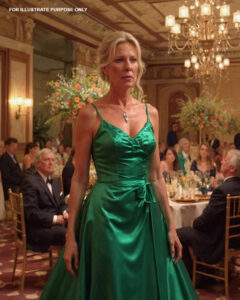I pass this mailbox on my morning jog, painted with colorful sunflowers and always decorated for the season. Last week, I saw a small round table with a handwritten sign stating, “FREE FLOWERS FOR SOMEONE YOU LOVE.”
There were jars of fresh carnations, tulips, and daisies from a garden. It was sweet. Wholesome. Just kept jogging.
The next day, I quit. Rather of flowers, I needed a reason to feel. My girlfriend and I were having trouble. We circled in the flat like strangers with shared debts, not communicating.
I took a jar.
I left it on the kitchen counter with “Thought of you.”
She spoke little but made me tea later that night. At least it started.
Flowers became a gentle ritual. I grabbed a new jar every few days and we resumed conversing. Even laughing.
However, one morning, there was only one jar and this folded card alongside it. I wouldn’t have noticed if the wind hadn’t flipped the corner.
“For Jude” was inscribed on the card. 10 years today.”
On the back: “Take only if you knew him.”
I keep wondering—who was Jude? Did I take anything I shouldn’t have?
Two days passed with that jar on our counter. I couldn’t stand to discard or relocate it. Every time I saw it, shame gnawed at me. Who was Jude? Was he a sibling, son, or partner? The many questions kept me up at night.
Curiosity won on day three. I investigated the free flower stand’s owner. Perhaps they might tell me more about Jude or pardon me for taking what wasn’t mine.
I returned at night when nobody was around. The mailbox house was small yet beautiful, with ivy climbing the walls and colorful pots on the front steps. Before I could knock, the door opened to reveal a late-50s woman with kind eyes and gray hair.
“You must be the one who took Jude’s flowers,” she said, sorrowful and amused.
Heart plummeted. “I… Nobody told me. I saw them and thought—
She kindly said, “It’s okay,” and invited me in. Come sit. Let me explain.”
Jude was Miriam’s youngest brother. Jude was biking home from work when a drunk motorist blew a red light and killed him eleven years ago. His death devastated his family, but Miriam sought comfort in gardening. She planted flowers around to fill his absence with color and life.
“Every year on the anniversary of his passing, I put out these flowers,” she said, pointing to a photo album on her coffee table. Jude smiled cheerfully with wildflowers behind his ear on the first page. “He loved giving flowers. They said it brightened their day. So now I do it for him.”
Hearing brought tears to my eyes. “I’m sorry,” I whispered. “I didn’t mean to intrude.”
Miss Miriam shook her head. “You didn’t invade. You reminded me why I do this—to connect and honor Jude. Why did you remove the flowers?
I thought about how much to say. Finally, I told her about my girlfriend and me growing apart and how sending home flowers had helped. “They gave us something to talk about again,” I said. “Good thing.”
Sad Miriam smiled. “Then Jude may have sent you them.”
In the following weeks, I saw Miriam often. I learned plant care from her and heard Jude stories. I discovered that he performed guitar at cafés and left tips in “Pay It Forward” jars. He valued kindness and connection, which Miriam’s flower stand reflected.
As we worked in her garden one afternoon, Miriam gave me a small packet of seeds. She said, “Plant these somewhere special. “Let them remind you of Jude—and of the importance of reaching out, even when it’s hard.”
I pledged.
I told my girlfriend everything about Jude, Miriam, and the flowers that had unwittingly brought us together when I arrived home. To my amazement, she didn’t laugh or ignore it. Instead, she grabbed her coat and said, “Let’s go plant them right now.”
We drove to a local park where we picnicked and read on Sundays. We made holes in the soft dirt and sprinkled seeds, anticipating their colorful blossoms. As we laughed and reminisced while working together, my heart felt lighter. Finally, optimism returned after months.
A lovely wildflower patch emerged from the seeds over months. People passing by would stop to appreciate them, taking photos or just breathing in the splendor. Miriam came us one sunny Saturday and exclaimed over the flourishing garden.
“These are Jude’s flowers now,” she proudly declared, shedding tears. “Thank you for letting him live through them.”
I realized something fundamental as we stood among the blossoms: grief evolves, not disappears. We may turn loss into legacy and suffering into purpose through love and kindness. The flowers and connections they sparked carried Jude’s soul.
After summer, my connection with my girlfriend was mended. The first jars of flowers started conversations that lead to forgiveness, understanding, and renewed commitment. We determined never to let silence divide us again.
And Miriam? She became a dear friend whose wisdom and warmth brightened our lives. Her flower stand touched many lives, including ours, in the area.
People are occasionally brought together by life in unexpected ways. A selfish act—taking free flowers without knowing their meaning—led to healing, gratitude, and connection. Jude died, but his kindness reminded me that even small acts may have a great impact.
Reach out if you’ve felt lost or detached. Leave a flower, seed, or note. What life you touch or whose story you tell may affect you forever.
Share this story with friends and family if it touched you. Let’s share kindness and connection one flower at a time. ❤️



